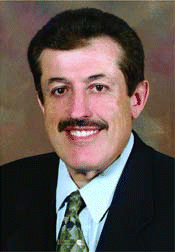Quality of Life Improves for Smokers and Nonsmokers
All patients involved in the study completed the SNOT-20 preoperatively and postoperatively. The preoperative SNOT-20 scores were similar for both groups, with an average score of 26.2 for smokers and 27.8 for nonsmokers. At three- and six-month follow-up, all patients showed improvement on their SNOT-20 scores. Surprisingly, smokers showed a greater overall short-term improvement in quality of life following surgery, with SNOT-20 scores averaging 5.7, compared with nonsmokers, whose SNOT-20 scores averaged 10.1. These scores reflect an improvement in score of 22.1 for smokers and 16.1 for nonsmokers.
Dr. Kountakis summarized, Basically, the conclusion of our study was that both smokers and nonsmokers had a great improvement in quality of life following endoscopic sinus surgery.
The 2005 Laryngoscope study cited earlier also seems to suggest that smoking may not be as predictive of poor surgical outcome as previously believed. This study showed no significant difference between smokers and nonsmokers in preoperative CT, pre- and postoperative endoscopy, and change in endoscopy scores. Smokers and nonsmokers also demonstrated similar improvement in postoperative Rhinosinusitis Disability Index (RSDI) and Chronic Sinusitis Survey (CSS) scores. This particular study concluded that acetylsalicylic acid intolerance and clinical depression are more predictive of poorer clinical outcomes following endoscopic sinus surgery than smoking.
It is generally acknowledged that the nasal mucosa is adversely affected by cigarette smoking in several ways. Heat and toxic elements may directly destroy ciliary cells. Tobacco smoke can cause irritation and inflammation. Production of cytokines, including interleukin-5, interleukin-8, and granulocyte-macrophage colony-stimulating factors are suspected to be a primary cause of inflammation of the sinuses. For these reasons, it is believed that patients who continue to smoke following surgery will receive minimal benefit from surgery and are more likely to require revision surgery. Smoking has also been shown to have a negative impact on surgical outcomes in general, potentially causing postoperative complications including delayed wound healing and increased risk for infection.
Another study, published in Laryngoscope in April 2006, concluded that smoking is a factor that adversely affects frontal sinus surgery outcomes. The authors of this study conducted follow-up on 157 patients four years following initial frontal sinus surgery for persistent symptoms of nasal blockage or congestion, headache, postnasal drip, and nasal discharge. All patients included in this study had failed at least four weeks of medical therapy before undergoing surgery. Fifty-two patients required revision surgery. Of these, 59.6% were smokers. After undergoing revision surgery, approximately 90% of all patients reported at least some overall improvement in their symptomatology. However, the authors found a statistically significant poorer outcome in all categories in patients who smoked.2


Leave a Reply